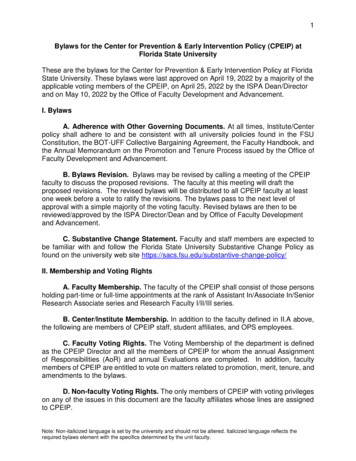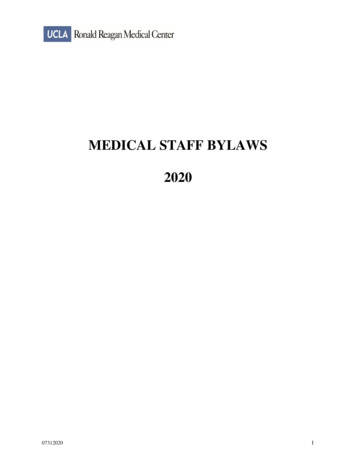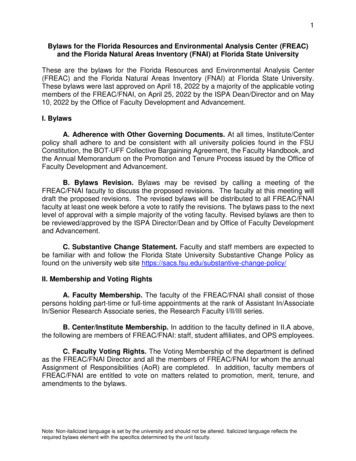
Transcription
1Bylaws for the Center for Prevention & Early Intervention Policy (CPEIP) atFlorida State UniversityThese are the bylaws for the Center for Prevention & Early Intervention Policy at FloridaState University. These bylaws were last approved on April 19, 2022 by a majority of theapplicable voting members of the CPEIP, on April 25, 2022 by the ISPA Dean/Directorand on May 10, 2022 by the Office of Faculty Development and Advancement.I. BylawsA. Adherence with Other Governing Documents. At all times, Institute/Centerpolicy shall adhere to and be consistent with all university policies found in the FSUConstitution, the BOT-UFF Collective Bargaining Agreement, the Faculty Handbook, andthe Annual Memorandum on the Promotion and Tenure Process issued by the Office ofFaculty Development and Advancement.B. Bylaws Revision. Bylaws may be revised by calling a meeting of the CPEIPfaculty to discuss the proposed revisions. The faculty at this meeting will draft theproposed revisions. The revised bylaws will be distributed to all CPEIP faculty at leastone week before a vote to ratify the revisions. The bylaws pass to the next level ofapproval with a simple majority of the voting faculty. Revised bylaws are then to bereviewed/approved by the ISPA Director/Dean and by Office of Faculty Developmentand Advancement.C. Substantive Change Statement. Faculty and staff members are expected tobe familiar with and follow the Florida State University Substantive Change Policy asfound on the university web site https://sacs.fsu.edu/substantive-change-policy/II. Membership and Voting RightsA. Faculty Membership. The faculty of the CPEIP shall consist of those personsholding part-time or full-time appointments at the rank of Assistant In/Associate In/SeniorResearch Associate series and Research Faculty I/II/III series.B. Center/Institute Membership. In addition to the faculty defined in II.A above,the following are members of CPEIP staff, student affiliates, and OPS employees.C. Faculty Voting Rights. The Voting Membership of the department is definedas the CPEIP Director and all the members of CPEIP for whom the annual Assignmentof Responsibilities (AoR) and annual Evaluations are completed. In addition, facultymembers of CPEIP are entitled to vote on matters related to promotion, merit, tenure, andamendments to the bylaws.D. Non-faculty Voting Rights. The only members of CPEIP with voting privilegeson any of the issues in this document are the faculty affiliates whose lines are assignedto CPEIP.Note: Non-italicized language is set by the university and should not be altered. Italicized language reflects therequired bylaws element with the specifics determined by the unit faculty.
2III. Organization and GovernanceA. Faculty Meetings. The CPEIP Director may call a faculty meeting at any time.In addition, the CPEIP Director will call a faculty meeting if two or more faculty requestsa meeting for a specific purpose.B. Director Selection. In the event the CPEIP Director will be vacating theirposition, the outgoing Director will make a recommendation as to their replacement to theISPA Director/Dean for consideration. A search committee may be formed to assist inthe recruitment and screening of applicants. Bargaining unit vacancies shall be advertisedthrough appropriate professional channels unless a waiver of announcement has beenapproved.C. Leadership and Committees. Leadership at CPEIP consists of:I. The Director - His or her duties include: Responsible for meeting administrative obligations of CPEIP Taking the lead in matters that concern the collective welfare of CPEIP Assigning duties to each specialized faculty members whose line is assignedto CPEIP via Assignment of Responsibilities Performing calendar year annual evaluations based on the quality of the workperformed by the specialized faculty member. Contributions to teaching,research and service are considered and weighted according to theAssignment of Responsibilities for that faculty member Supervising the department staff and performing those annual evaluations Recommending salary merit/discretionary increases for those faculty and staffhe/she supervises Providing non-tenure-track faculty members, whose lines are assigned CPEIP,a written evaluation of their progress toward promotionII. Promotion Committee Charged with the responsibility of reviewing the binders of all prospectivecandidates for promotion in CPEIP annually and recommending action on thenomination of each candidate The committee shall have at least three members The CPEIP Director shall request volunteers to serve on the committee. In theevent not enough faculty volunteer then relevant faculty will vote on who willbecome committee members. Membership on the Promotion Committee shallserve a two-year term. If another Center/Institute has faculty being consideredfor promotion, and that Center/Institute doesn’t have enough faculty volunteers,then the ISPA Dean/Director may request faculty from CPEIP to serve on thecommittee. Membership on the Promotion Committee shall serve a two-yearterm.Note: Non-italicized language is set by the university and should not be altered. Italicized language reflects therequired bylaws element with the specifics determined by the unit faculty.
3III. Various committee and sub-committee activities related to instruction, research,creative activity, etc.IV. The CPEIP Director may establish ad hoc committees as deemed necessaryto assist in the operation of CPEIP.V. Search Committees may be established by the Chairs/Directors to assist in therecruitment and screening of applicants for continuing faculty positionsD. Faculty Recruitment. CPEIP faculty members shall be included in the processof recruitment. Bargaining unit vacancies shall be advertised through appropriateprofessional channels unless a waiver of announcement has been approved.E. Unit Reorganization. CPEIP faculty members will be involved in the decisionsinvolving unit reorganization.IV. Curriculum (if applicable)N/AV. Annual Evaluation of Specialized Faculty on Performance and MeritA. Peer Involvement in Annual Performance and Merit Evaluation Each facultymember’s performance will be evaluated relative to his or her assigned duties. Eachfaculty member’s performance will be rated annually using the following university ratingscale:Substantially Exceeds FSU’s High ExpectationsExceeds FSU’s High ExpectationsMeets FSU’s High ExpectationsOfficial ConcernDoes Not Meet FSU’s High ExpectationsEach faculty member may be evaluated by his/her peers within the CPEIP and/or by theCenter Director. The peer review will be based upon the criteria in this section and beconducted in accordance with a format and procedures decided by the relevant faculty.The CPEIP Director or the appropriate evaluator, as determined by University supervisorrelationships, reviews all documentation/data submitted by the faculty member as well aspertinent information from other sources as applicable and completes the AnnualEvaluation Summary Form indicating one of the applicable five performance ratingcategories. If a non-tenured faculty member receives a “Does Not Meet FSU’s HighExpectations” overall performance rating, a Performance Improvement Plan (PIP) will bediscussed with the faculty member and submitted with the Annual Evaluation SummaryForm for approval to all appropriate levels of administration. After the faculty memberand evaluator meet, discuss the evaluation, and both parties sign, the evaluation formNote: Non-italicized language is set by the university and should not be altered. Italicized language reflects therequired bylaws element with the specifics determined by the unit faculty.
4along with the evaluator’s narrative and applicable attachments, are routed to the ISPADirector/Dean for review. After review and signature by the ISPA Director/Dean, theevaluation form and any attachments are returned to the CPEIP. The faculty memberreceives a copy of the evaluation and the original is placed in the faculty member’sconfidential evaluation file. As part of this process, all faculty members eligible forpromotion are apprised in writing of their progress towards promotion. The performanceevaluation process is implemented as specified by guidelines provided by the Office ofthe Vice President for Faculty Development and Advancement.Faculty within CPEIP will develop merit recommendations for submission to the CenterDirector based upon the criteria in this section. Evaluation criteria and procedures shallensure faculty members on approved leave are not penalized in the evaluation process.The CPEIP Director will submit faculty merit pay increase recommendations to theDirector/Dean of ISPA for faculty members that satisfy relevant criteria. After approval,appropriate paperwork will be submitted to implement the pay increase as specified inguidelines provided by the Office of the Vice President for Faculty Development andAdvancement and/or Budget and Analysis.B. Criteria for Evaluation of Specialized Faculty & MeritI) Teaching – The ability to teach in an effective manner through oral and writteninstruction.II) Scholarship/Research – Contributions to research and other creative activityincluding effectiveness at securing external funding and the timely completion ofcontractual obligations.III) Service/ Professional Services – Contributions in the area of service toCPEIP. Effectiveness in providing professional services to the public and private sectorsof the community, state, and nation.IV) Other – Other University duties, contributions, and/or effectiveness asappropriate to the assignment.The following five categories are used when evaluating the faculty member’s performanceof duties: Meets FSU’s High Expectations – This describes an individual who demonstrates therequisite knowledge and skills in his/her field of specialty and completes assignedresponsibilities in a manner that is both timely and consistent with the highexpectations of the university. Exceeds FSU’s High Expectations – This describes an individual who exceedsexpectations during the evaluation period by virtue of demonstrating notedachievements, as appropriate to the assignment, in teaching, research, and service,which may include several of the following: high level of research/creative activity ofNote: Non-italicized language is set by the university and should not be altered. Italicized language reflects therequired bylaws element with the specifics determined by the unit faculty.
5national importance, attaining national achievements, awards, and recognition,willingness to accept additional responsibilities, high level of commitment to the overallmission of the Department, involvement/leadership in professional associations,initiative in solving problems or developing new ideas. Substantially Exceeds FSU’s High Expectations – This describes a faculty memberwho far exceeds performance expectations during the evaluation period and achievesan extraordinary accomplishment or recognition, as appropriate to the assignment, inteaching, research, and service, which may include several of the following: highlysignificant research or creative activities of international importance; demonstratedrecognition of the individual by peers as an authority in his/her field; securingsignificant external funding; attaining significant international achievements, awards,and recognition. Official Concern – This describes an individual who demonstrates the requisiteknowledge and skills in his/her field of specialty but is not completing assignedresponsibilities in a manner that is consistent with the high standards of the university. Does Not Meet FSU’s High Expectations – This describes an individual who fails todemonstrate with consistency the knowledge, skills, or abilities required in his/her fieldof specialty and/or in completing assigned responsibilities.VI. Promotion of FacultyA. Progress Toward Promotion Letter. Each year, every faculty member who isnot yet at the highest rank for their position will receive a letter that outlines progresstoward promotion and/or tenure. As part of this process, all faculty members eligible forpromotion are apprised in writing of their progress towards promotion. The performanceevaluation process is implemented as specified by guidelines provided by the Office ofthe Dean of the Faculties.B. Peer Involvement in Evaluation of Promotion of Faculty. CPEIP will acceptrecommendations for promotion every year in the Spring semester. The recommendationoriginates with the faculty member’s immediate supervisor. The CPEIP Director willreview all documentation and forward his/her advice to the ISPA Director/Dean.C. Criteria for Promotion of Specialized Faculty. The guidelines followed by theCPEIP Promotion Committee are the same as those of the University. The followingelements will be considered when recommending a specialized faculty member forpromotion. These elements include, but are not limited to:PROFESSIONAL ACCOMPLISHMENT:Effectiveness in the performance of teaching dutiesRelevant years of experienceSubmission of contract and grant proposals for external fundingNote: Non-italicized language is set by the university and should not be altered. Italicized language reflects therequired bylaws element with the specifics determined by the unit faculty.
6Timely completion of contractual and grant obligationsPublication of books, brochures, chapters in books, articles in refereed and un-refereedjournals and/or professional publicationsFeatures and/or citations in professional magazines, newsletters, or on professionalwebsitesDemonstrated expertise in the area of research, creative activity, or field of specialtyPresentations at meetings, workshops, or conferences of professional societiesOther professional accomplishments as appropriatePROFESSIONAL RECOGNITION:Recognition as an authority in the area of research, creative activity, or field of specialtyInvited talks at meetings, workshops, conferences or within the University communityOrganization of workshops, seminars, professional conferences, and meetingsMembership and/or positions of responsibility in professional organizationsProfessional honors, awards, and other recognitionsContract and grant funding awarded from external sources including federal, state, local,and privateOther professional recognition as appropriatePROFESSIONAL SERVICE:Service to the CPEIP and the University directing/supervising undergraduate andgraduate research as well as committee and sub-committee activity related to instruction,research, creative activity, etc.Service in providing professional services to the public and private sectors of thecommunity, state, and nationOther service, including administrative assignments, as appropriateELIGIBILITY CRITERIA:All Specialized Faculty promotion decisions shall take into account:1. Annual evaluations.2. Annual assignment of responsibility (AOR).3. Fulfillment of the department/unit written promotion criteria in relation to theassignment in the supervisor’s letter. (All departments/units must have writtenpromotion criteria and procedures for all applicable Specialized Faculty availablein the department/unit, posted on a single publicly accessible University Web site,and on file in the Office of the Vice President for Faculty Development andAdvancement.)4. Evidence of sustained effectiveness relative to opportunity and according toassignment in the supervisor’s letter.5. All actions are effective the beginning of the next academic year.Note: Non-italicized language is set by the university and should not be altered. Italicized language reflects therequired bylaws element with the specifics determined by the unit faculty.
7Research Faculty or Curator track promotions shall take into account:1. Scholarly or creative accomplishments of high quality, appropriate to the field, inthe form of books and peer-reviewed scholarly publications.2. Success in obtaining external funding, as principal investigator or co-principalinvestigator on grants.3. Recognized standing in the discipline and profession, as attested to by letters fromoutstanding scholars outside the university.4. Other research-related activities, such as chapters in books, articles in refereedand non-refereed professional journals, musical compositions, exhibits of paintingsand sculpture, works of performance art, papers presented at meetings ofprofessional societies, reviews, and research and creative activity that has not yetresulted in publication, display, or performance.Research Support Faculty promotion shall take into account:1. Evidence of contributions in support of research, as attested by internal letters fromcollaborators at FSU.2. Scholarly or creative accomplishments of high quality and appropriate to the field(books and peer-reviewed scholarly publications).3. Success in obtaining external funding as principal or co-principal investigator on agrant.4. Other research-related activities, such as chapters in books, articles in refereedand non-refereed professional journals, musical compositions, exhibits of paintingsand sculpture, works of performance art, papers presented at meetings ofprofessional societies, reviews, and research and creative activity that has not yetresulted in publication, display, or performance.Ranks1. Promotion in the specialized faculty ranks is attained through meritoriousperformance of assigned duties in the faculty member’s present position.2. Promotion to the second rank in each track shall be based on recognition ofdemonstrated effectiveness in the areas of assigned duties.3. Promotion to the third rank in each track shall be based on recognition of superiorperformance in the areas of assigned duties.Note: Non-italicized language is set by the university and should not be altered. Italicized language reflects therequired bylaws element with the specifics determined by the unit faculty.
8In all cases, the CPEIP will adhere to Florida State University policy. Any proposedchanges to these bylaws must be approved by the relevant faculty of CPEIP and theDirector/Dean of ISPA, and be consistent with the criteria established by the Universityas well as those by ISPA. A copy of the criteria must be on file in the Office of the VicePresident for Faculty Development and Advancement.Note: Non-italicized language is set by the university and should not be altered. Italicized language reflects therequired bylaws element with the specifics determined by the unit faculty.
Florida State University These are the bylaws for the Center for Prevention & Early Intervention Policy at Florida State University. These bylaws were last approved on April 19, 2022 by a majority of the . If another Center/Institute has faculty being considered for promotion, and that Center/Institute doesn't have enough faculty volunteers,










